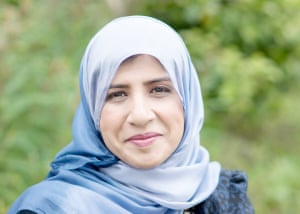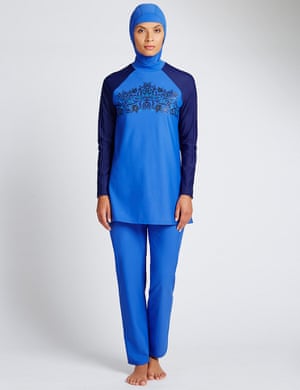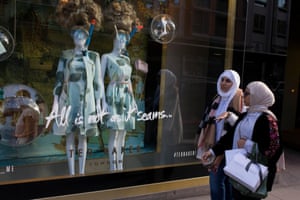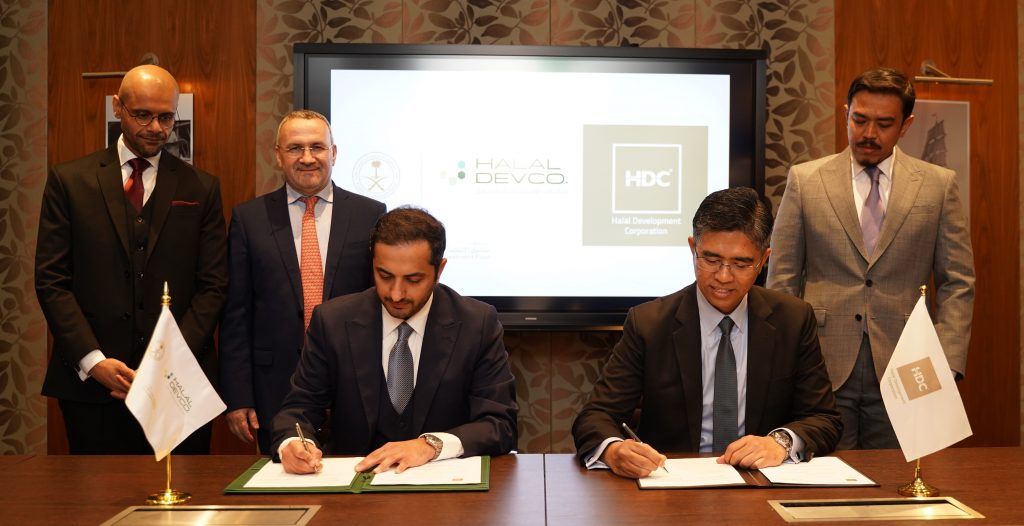Global brands are waking up to the massive opportunities of the worldwide Muslim market but many still misunderstand or ignore the potential of a burgeoning sector that is young, highly educated and collectively has enormous spending power.
The world’s 1.6 billion Muslims constitute a largely untapped commercial market, the Muslim Lifestyle Expo conference in London heard on Thursday. The halal market is worth $2.1tn (£1.5tn) annually in the US alone, and is increasing at $500bn a year.
“A huge opportunity is being missed by corporate brands, but [the market] is being taken by storm by young Muslim startups,” said Shelina Janmohamed, vice-president of Ogilvy Noor, an Islamic branding agency.

She pointed to recent indications that global brands were beginning to target Muslims. A decision by Marks & Spencer to sell a range of ‘burkinis’ – full-cover swimsuits – in the UK last month prompted heated debate. H&M, one of the world’s biggest fashion chains, attracted attention with an ad featuring a model in a hijab last year. Tesco
 ran a promotion for the Muslim holy month of Ramadan last June – although it was ridiculed when one store included smokey bacon flavoured crisps in its display.
ran a promotion for the Muslim holy month of Ramadan last June – although it was ridiculed when one store included smokey bacon flavoured crisps in its display.
But there was still a long way to go, said Janmohamed. “One of the complaints we hear is that Muslim consumers feel they are not engaged with, as businesses do not reach out to them,” she said.
Tabish Hasan, chief executive of the US-based Muslim Ad Network, compared the failure of major brands to tap into the Muslim market now to a similar disregard of the potential of the Hispanic market in the US in the 1980s. “Now those brands can’t afford not to engage with the Hispanic market,” he said. “The Muslim lifestyle market is moving in the same direction – it’s so big, it has so much spending power. It’s just a matter of time.”
Janmohamed said her company’s research had found that more than 90% of Muslim consumers said their faith had some influence on purchases. They wanted food, beverages and personal products to be sharia-compliant, but showed more flexibility in products
to be sharia-compliant, but showed more flexibility in products and services such as finance, insurance and travel
and services such as finance, insurance and travel
 .
.

Although most wanted acknowledgement and engagement from global businesses, some worried that corporations were motivated by the chance to profit from the Muslim market, she told the Guardian.
Some big brands had faced a backlash against initiatives aimed at reaching Muslims, said Hasan. He cited a well-known US chain whose inclusion in publicity material of the greeting Eid Mubarak, to celebrate a Muslim festival was met with a storm of criticism. “It has made a lot of companies hesitate.”
Janmohamed said Muslim consumers broadly fell into two groups: futurists and traditionalists. Futurists combined faith and modernity. “They’re proud to express their Muslim identity, but are also brand-conscious and brand-loyal. They are open to the world, very tech-savvy and very engaged in social media.” Futurists – also described as “Generation M” – were younger and had influence disproportionate to their numbers, she added.
Navid Akhtar, chief executive of the Islamic television production company Alchemiya, sketched out a similar group, which he dubbed global urban Muslims, or “gummies”. They were “hyperdiverse, spiritual rather than Religious-with-a-capital-R, educated, transnational – their family may be originally from Pakistan but now could be scattered across Canada, South Africa and the UK – they have a high disposable income, and the vast majority are English speakers.”
A key subset of gummies was “mipsters” – Muslim hipsters, aged between 16 and 24, whose hallmarks were identity, image, fashion, friendship and education, he added.
Young Muslim entrepreneurs
 were responsible for an explosion in small business startups marketing products
were responsible for an explosion in small business startups marketing products
 and services, particularly in the spheres of fashion, cosmetics and personal products, and food. “When a young Muslim consumer doesn’t find a product
and services, particularly in the spheres of fashion, cosmetics and personal products, and food. “When a young Muslim consumer doesn’t find a product that they are looking for on the high street, their instinct is to go and create it themselves,” said Janmohamed. “Consumer power determines what works.”
that they are looking for on the high street, their instinct is to go and create it themselves,” said Janmohamed. “Consumer power determines what works.”


 display in central London. Photograph: Alamy
display in central London. Photograph: Alamy Altaf Alim of fashion brand Aab said his company wanted to bring the quality, presentation, packaging and customer experience of an upmarket western store to Muslim consumers. Until Aab was launched eight years ago, women had little choice but to buy hijabs and abayas from market stalls. “What was missing was an aspirational lifestyle brand. There was no premium option,” he said.
ARTICLE TWO
World Bulletin / News Desk
From young start-ups to business giants,BRITISH ENTREPRENEURS are eyeing a rapidly expanding global market for Muslim consumers with a range of brands from clothes
are eyeing a rapidly expanding global market for Muslim consumers with a range of brands from clothes to greetings cards to online gym courses.
to greetings cards to online gym courses.
In contrast to France, where there has been an angry debate about Muslim-specific consumerPRODUCTS , the approach in Britain seems more business-minded.
, the approach in Britain seems more business-minded.
“Halal doesn’t only apply to food but also to business ethics, dress etcetera,” said Rauf Mirza, director of The Muslim Lifestyle Expo (MLE), which organises trade fairs on Muslim consumer trends.
The MLE this week organised a networking event bringing together 150 business leaders, experts and young entrepreneurs in central London toTRADE TIPS
in central London toTRADE TIPS on the best way to profit from an expanding sector.
on the best way to profit from an expanding sector.
Famous names like the Marks & Spencer department store chain nowOFFER Islamic fashion products — in line with other world brands including Italian fashion house Dolce & Gabbana or Japan’s Uniqlo.
Islamic fashion products — in line with other world brands including Italian fashion house Dolce & Gabbana or Japan’s Uniqlo.
In a debate about Dolce & Gabbana’s business move, French women’s rights minister Laurence Rossignol compared women who wear the Muslim headscarf to “negroes who supported slavery” sparking a furious row that has put her under pressure to resign.
“Crossing the Channel, there is more pragmatism on these issues, which are seen only through an economic prism. It’s seen as a business opportunity,” said French businessman Ali Djedid, whose company Zeynara is based in Paris.
“In France instead we immediately politicise the debate,” said Djedid, a former financial analyst.
“There is no doubt that there is a market, that it is growing and that we also need to adapt to modern consumer trends,” he said.
‘Big gap in the market’
At the MLE event, Faaezah Qureshi from Yorkshire in northern England said she set up her Muslim greetings cards company Elaara after finding too many contained unsuitable images such as champagne glasses and churches.
Zahra Pedersen said she launched her online fitness course “The Healthy Hijab” for women who wear the veil and are embarrassed going to the gym with men.
“There was a big gap in the market,” Pedersen, who was not wearing a hijab, said.
Shelina Janmohamed, vice president at advertising company Ogilvy Noor, started off the London networking event with a talk on how British companies could “tap into the global Muslim lifestyle sector”.
She estimated Muslim consumer lifestyle spending at $2.6 trillion (2.3 trillion euros) a year and pointed to the potential in the youth market in particular, with official data showing 14 percent of the world’s population was Muslim and under 30 in 2010.
Janmohamed pointed to European countries with large Muslim minorities such as Russia (12 percent), France (7.5 percent), Netherlands (5.5 percent), Britain (5.0 percent) and Germany (5.0 percent).
It is not just Muslim entrepeneurs who are being drawn to the business opportunities.
Canadian David Horne co-founded Alchemiya, a “Netflix for Muslims” with subscribers in 39 countries and offers programmes including documentaries on skateboarding in Kabul or Turkish muezzins.
Established names too are becoming more interested in marketing directly to Muslim consumers, including British supermarket chain Tesco which launched a Ramadan advertising campaign last year.
“If you’re a global brand, how can you ignore 1.6 billion people?” Mirza said.
Source: Agence France-Presse


